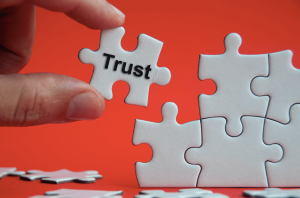Sean and Jason* have worked together for years. More often than not, they’ve worked at the same level in the company, though in recent years Sean has reported to Jason. It’s not unusual for them to have their differences, and the HR manager knows more than she would like to about their dynamic.
But then things really escalated a year ago when Sean felt that Jason threatened him. Sean was livid and launched a formal complaint of bullying and harassment. Part- way through the investigation, both Sean and Jason were given the option of mediation to resolve their issues, but this would mean putting the investigation on hold. Both men reluctantly agreed to try mediation.
Why Workplace Mediation Matters
Workplace conflicts sometimes make me think of a song by the country-music duo Brothers Osborne called “It Ain’t My Fault.” It’s a catchy tune that speaks to the human tendency to assign blame to others when things go wrong.
Mediators are neutral, so their role is not about assigning blame. The focus is not on who is right or wrong, but on what can participants agree to going forward. This is such an important shift and a big part of why workplace mediation is a quick, creative and relatively inexpensive way to resolve issues that come up between people at the office or in a working group.
That’s especially true when compared to some alternatives like a workplace investigation or an adjudication process where a finding of fact, as well as an assigning of blame, is central to the process. The cost can be significant, and a lot of people describe the aftermath of an investigation as worse than before it took place. That said, there are circumstances where alternative processes such as investigations or adjudication are warranted.
Mediation can also be effective for groups that are not necessarily in conflict but want a collaborative process to determine how decisions will be made or to clarify group roles and responsibilities.
Causes and Costs of Conflict
So how does conflict in the workplace start? Most often it’s because of a miscommunication between two or more people, a breakdown in a working relationship or problems arising from poor performance evaluations. These scenarios can lead to challenging team dynamics, claims of bullying and harassment and reduced productivity and work performance.
In my research, depending on the study, however, I consistently found that in Canada workplace conflict costs up to billions each year. While this typically includes direct costs such as sick days, absenteeism, grievances and litigation, this research does not always include the indirect costs of conflict such as decreased productivity when people avoid working on a project because they are also trying to avoid a conflict between another colleague or group.
In fact, a CPP Inc. U.S. study of workplace conflict in 2008 found that most employees spent 2.8 unproductive hours each week due to conflict situations. This does not include the amount of time managers spend trying to manage conflict.
How to Get on Track
As a mediator, here are my five tips to help people share information, understand different perspectives and, hopefully, get back on track:
1) Determine three things you each want the other person to hear. Take turns without interrupting and really listen to each other. Anticipate hearing something you do not agree with and be prepared to focus on what they are saying anyway without reacting.
2) Keep an open mind and be curious. Try to understand what is important to the other person and how they feel. Instead of making assumptions, ask questions. Try to avoid questions that include “why” as they can be perceived as judgmental or challenging. A simple option is to say, “Tell me more about this.”
3) It can also be helpful to talk about the impact the conflict or circumstance has had on you or someone you know. This will be less likely to trigger defensiveness in the other person.
4) Acknowledge that there is more than one solution to every issue or obstacle, so be flexible and think of at least two ideas or suggestions to move things forward.
5) If you cannot agree on what has happened in the past, shift your focus to what you can all agree on to go forward.
If all participants follow what they agree to (which is more likely when they create the terms together), it can do a lot to repair a relationship and rebuild trust over time.
What Really Counts
If you or your HR department are unable to manage the conflict on your own, mediators can be an important part of moving things forward in a positive and constructive way. The dialogue may be intense, so some people like the idea of having someone impartial to both or all participants to prepare and guide them through these tough conversations.
According to Mediate BC’s 2016 Business of Mediation Survey, mediators help to resolve all of the issues in 86 per cent of workplace files, and 82 per cent of participants said they were satisfied with the process, while 79 per cent were satisfied with the outcome.
A Deeper Understanding
So what happened with Sean and Jason? Was Sean bullied? Mediators will make no such determination. Sometimes bullying could have occurred and sometimes there are personality differences at play. During the mediation process, both participants learned more about the reasons behind certain decisions — things they had not known previously.
Suddenly, Sean realized he was not overlooked for promotions, as he once assumed. Other things came to light, including the fact that Sean did not totally trust Jason and had been feeling bored and under-utilized at work. Jason knew of a new position that the company wanted to fill and he had previously not considered Sean because he had no idea Sean was up for a new challenge.
Sean agreed to withdraw his complaint and effectively stop the investigation, and Jason agreed, with permission from his boss, that Sean would take some training and start in a new position in the company in a few months. Sean would no longer report to Jason when he started the new role. Both Sean and Jason felt relieved and no longer dreaded the idea of going to work.
It doesn’t always matter who is at fault — most people say that feeling heard or understood is more important. This is particularly true when the participants need to continue working together in some way.
All relationships have their challenges and it is common to find conflict in a project team or working group, between colleagues or between a manager and an employee. How you choose to handle the conflict going forward is what really counts.
* While this example is representative of workplace mediation, certain elements were altered to ensure confidentiality, which is a critical component of any mediation.
Thank you to Douglas Magazine for publishing this article in the October/November 2017 issue



